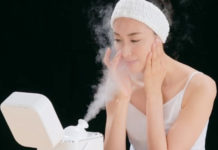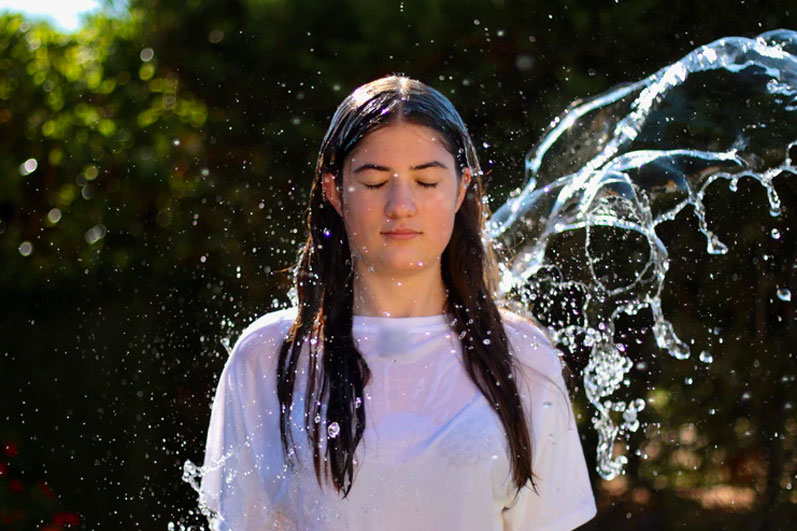Affiliate Disclaimer
Some links in this article are affiliate links. We may earn a small commission if you make a purchase through these links, at no extra cost to you. We only recommend products we find useful to our readersWhen hot winds slap against your face or skin products act clingy and fail to get absorbed by the skin, it needs hydration. Ever heard of humectants in skincare?
When your skin is deprived of hydration, it explodes in the form of greasiness, dryness, or loses the ability to regenerate new skin cells and that’s when you need humectants in skincare. Why is it necessary? To act as a shield and hydrates your skin.
Let’s read this article to know more about humectants in skincare, how they work, types of humectants, and their benefits.
What is a Humectant in Skin Care?
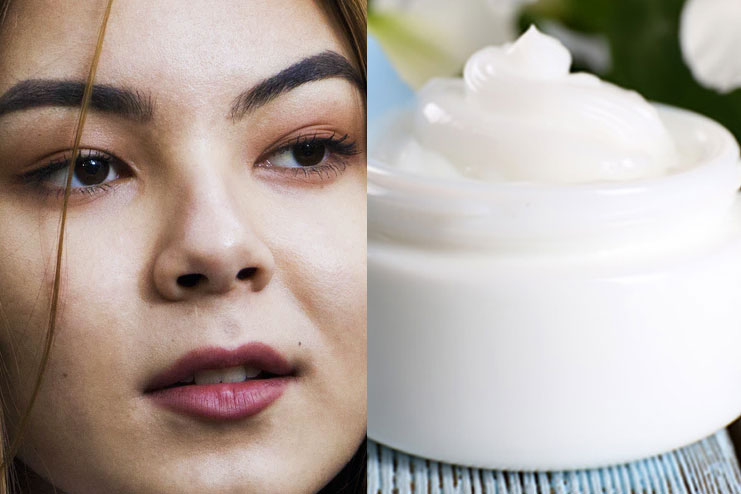
Humectants (R) are hygroscopic compounds. In other words, this compound performs a function. It attracts water from two places. One, from the dermis into the epidermis. Two, this compound attracts water from humid conditions or the environment.
By nature, humectants have emollient properties (R) that constitute other ingredients such as lactic acid, carboxylic acid, glycerol, and a few other properties.
There is one clause to humectants. It is healthy in your skin care of hair care products only if it is present in lower concentrations.
Humectants are present in every product from the skin to your hair. Call this a plus point or minus, humectants work based on how the other ingredients react in that product. This ingredient is a savior no doubt. However, it can easily be influenced too.
Interestingly, the clan of humectants is large. Having said, this humectant is of different types and every type has a different benefit to offer to your skin. By chance, if you use the wrong kind of humectant on your skin, it will steal moisture and make you look old.
Read: 10 Best Korean Oil Cleansers For Every Skin Type!
How Do Humectants Work?
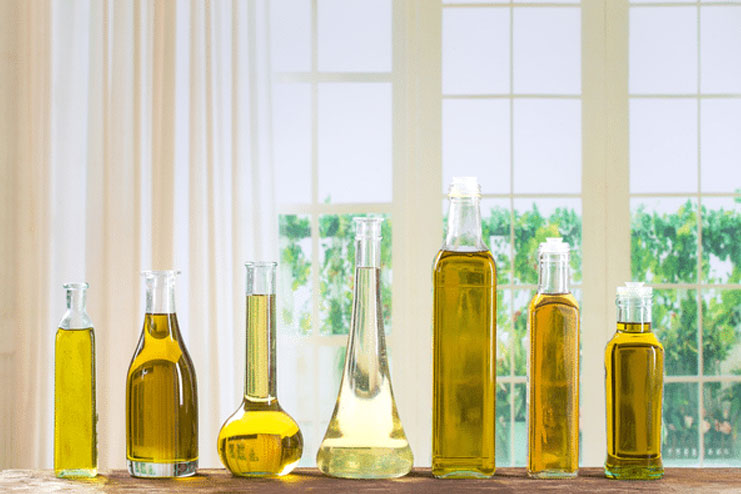
Humectants do the task of attracting water into your skin. As mentioned earlier, it takes moisture from the deepest skin layer, from the environment and reacts based on the other ingredients accompanying it in the product.
As we’ve studied earlier, what these humectants do is use molecules of water to form hydrogen bonds.
It is due to these hydrogen bonds that the humectants are capable of holding up to 1000 times their own weight in water. These water molecules do good to dehydrated skin. It wraps all the water and keeps your skin soft and happy with enough moisture.
Remember this!
Whether you have oily or dry skin, both need humectants. Looking at a larger picture, ingredients used on oily or dry skin complement each other.
How? your skin is dry because there is not enough moisture. On the other hand, oily skin is greasy because there is not enough water.
Therefore, in a skin product, both of these ingredients, humectants, and natural or botanical oils are there to support each other.
Now talking of how humectants work on the skin, these ingredients replicate the role of oil and give that extra boost of hydration to your skin by securing it from any kind of water loss and it safeguards the epidermis by preventing it from getting dry.
The part of your skin that gets hydrated with humectants is known as the epithelium. It is pinkish, watery, and fresh. For the most part, hydration is a must for this specific layer on the skin from time to time. Thus, skin products with humectants, do it all!
Not to forget to mention, these humectants even grab moisture and sustain it in your hair. However, not all those humectants good for the hair are good for the skin too. There is a difference in both the humectants.
Products having humectants boom in the skin care industry and buyers are satisfied with it. The catch is that you must know as to which humectant is good for your skin.
Read:10 Effective Benzoyl Peroxide Products For Clear Skin!
Are Humectants Good for Your Skin?

So far, we have understood how natural humectants work exceptionally well on the skin. When it comes to synthetic humectants, we cannot be sure that every humectant is safe for the skin or not.
That being said, natural humectants have relatively lesser complications than synthetic humectants undoubtedly. One of the humectants named formaldehyde is not good for the skin because it might cause skin problems. For example – dermatitis.
Given the fact that humectants are hydrophilic in nature, they are prone to extract moisture from everywhere. The only condition is it has to be nearby.
However, it is debatable if they are bad for your skin in a few environments because it absorbs water from the environment regardless of being moist or dry. By chance, if the weather out there is dry, this humectant will completely dry up your skin.
All in all, products having humectants as its significant ingredient is necessary for women having dry skin. On the other hand, women having oily skin can ignore the ingredient as it is not a priority for women with oily skin, although it does good to oily skin too.
Read: Laneige Water Sleeping Mask Review – Overnight Rich Skin!
Benefits of HumectantsOn Your Hair And Skin

We know tons about humectants now. Let’s quickly read through a list of benefits humectants offer to the skin and hair. Take a look!
For Skin
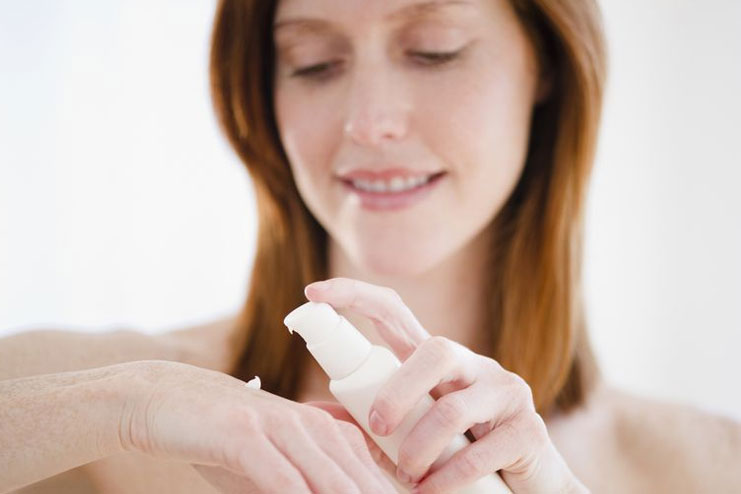
- It protects dry skin with its moisturizing ingredients. However, humectants alone cannot perform miracles on your skin, you need other moisturizing or hydrating ingredients too. Perhaps you might need occlusive and emollients too.
- Using humectants with emollients will make your skin supple and nice. For instance, squalene.
- Using humectants with occlusive will not only moisturize your skin but it will help with retaining the moisture in your skin. When moisture is retained, there won’t be breakouts and dryness.
- Humectants have anti-aging benefits on the skin. By boosting moisture, it improves elastin and this makes your skin look youthful.
Read: 13 Great Homemade Face Masks to Tighten Facial Skin
For Hair

Humectants are most suitable for women having natural hair. For the hair, humectants are there in pomades, conditioners, natural butters, leave-in-conditioners and gels. This nutrient has the following benefits on your hair
- It softens your hair strands.
- This nutrient makes your hair look voluminous and bouncy.
- It helps with maintaining curls in the hair.
- It is such a powerful ingredient that it won’t break your hair easily.
Reiterating on humectants reaction in different environments, when it comes to your hair, if you are in a moist environment and end up using a product that has humectants, this will make your hair frizzy and the cuticles get weak.
Types of Humectants
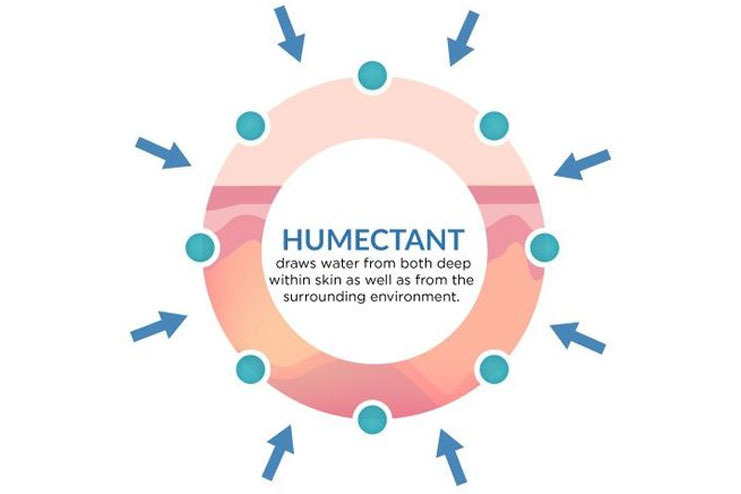
There are only two types of humectants. One humectant is natural and the other is synthetic. Both of these humectants are used in both hair care and skincare products.
The only difference in the benefits of these two humectants is the care or nourishment done to your school. In the case of natural humectants, the skin gets well nourished. Whereas, synthetic humectants don’t nourish the skin well.
Specific Natural Humectants To Look For
Here are specific kinds of natural humectants you should see for your skin. Take a look!
No 1 – Aloe Vera
Aloe-Vera (R) works as a natural humectant. By looking at aloe vera juice, it is easy to say that it has moisturizing properties. Aloe vera is found in many skincare products. It has emollients and keeps the skin hydrated for long. No stressing out as to whether it will suit your skin or not. It is quite gentle and effective.
Read: Find Everything about Using Aloe Vera
No 2 – Honey
The basic nature of honey (R) is to moisturize your skin. Its very nature is healthy and good for both the hair and skin. It has essential vitamins and minerals to moisturize, nourish and make your skin soft.
No 3 – Alpha Hydroxy Acids
Yet another source of an effective humectant is alpha hydroxy acids (R) This nutrient is derived from plants and it has the following nutrients
- Glycolic acid
- Mandelic acid
- Malic acid
- Lactic acid
A mixture of these nutrients works as a medicine and boosts your skin’s moisture levels by deep diving into your skin.
No 4 – Tremella Fuciformis Extracts
The plant extract of Tremella Fuciformis Extracts might sound Greek and Latin to you. However, these plant extracts are healthy for boosting the moisture levels in your skin. End of the day, all that the skin needs is hydration to look healthy. This key ingredient is even used in Korean Beauty products.
No 5 – Hydrating Mask
Even hydrating masks have an effective formula of softening and moisturizing your skin, one such hydrating mask is Seaweed and Algae. These nutrients are completely nourishing and good for your skin.
Read:12 Revitalizing Homemade Collagen Face-Masks You Will Love!
Specific Synthetic Humectants To Look For
Here are specific kinds of synthetic humectants you should see for your skin. Take a look!
No 1 – Glycerol/Glycerin
As mentioned earlier, glycerin (R) is good for the epidermis. This humectant is naturally present in plants and animals. If you want to derive glycerin from vegetables, you will find it in coconut, soy, or palm.
You cannot say that glycerin is completely natural. It does have a few synthetic ingredients too. Glycerol is synthetic for and it is one form of alcohol. This ingredient boosts the hydration levels on your skin.
By any chance, if you want to use a replaced ingredient to glycerin. You can try Sorbitol. It is as hydrating and effective as glycerin is.
No 2 – Polyethylene glycols (PEGs)
This synthetic humectant is similar to propylene glycol (R). This humectant has carcinogens. Not a pure ingredient on your skin. If you want soft skin, this petroleum-based compound will do that task perfectly for you.
This synthetic humectant extracts all the moisture from the lower layers of your skin. However, it doesn’t contribute back anything.
The commonly used PEGS are PEG 400 and PEG 600. These humectants can cause skin irritation or allergic reactions.
No 3 – Silicones
Silicones seem totally fancy as it has the ability to soften your skin. However, this human-made chemical doesn’t give your skin the space to breathe effectively and this can lead to acne and dryness.
No 4 – Sodium PCA
If our synthetic humectants didn’t co-operate or exist in our skincare products, we would have missed out on a lot. Having said, Sodium PCA is present in shampoos, conditioners, creams, lotions, foundations, and lipsticks. This humectant is not used in large quantities.
No 5 – Hyaluronic Acid
Hyaluronic acid (R) is naturally present in our body in tissues and joints. This humectant is synthetically produced and used on the skin for improving the moisture in your skin.
No 6 – Urea
If you remember, we’ve mentioned earlier that humectants add in lower concentrations are safe. To continue, urea (R) is one of those humectants that should be added in low concentrations as it can otherwise cause acne, rashes, and a burning sensation.
The biggest advantage of this humectant is that it holds the moisture in your skin and keeps it well hydrated. It is a colorless organic compound.
Tips On Using Humectants To Boost The Moisture In Your Skin
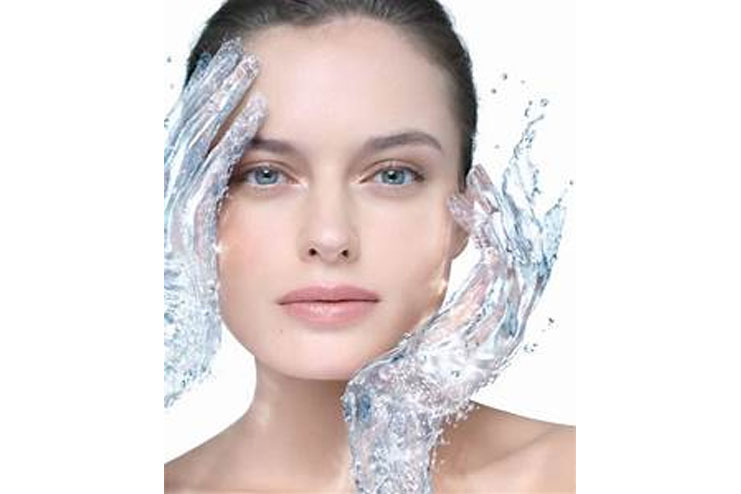
Have you ever heard of following the right way to use a moisturizing product?
It was surprising to come across something like this. That being said, if you want to moisturize your skin well, it is essential to know how to use humectants. This is what you need to know, take a look!
It is always essential to apply a moisturizer after taking a shower. Don’t apply the moisturizer when your skin has completely dried up. Apply it when it is slightly wet.
If you are undergoing a skin treatment and the doctor has prescribed a lotion. In that case, apply the lotion and then the moisturizer.
Did you know that the direction of applying your sunscreen matters? Yes, it is surprising but it does matter. Stick to applying the sunscreen moisturizer downwards.
At any cost, avoid rubbing the moisturizer up and down or in circular motions.
Always use a moisturizer that can be easily absorbed by your skin.
These were some of those basic tips on applying a moisturizer that has humectants. These tips hold good even if your moisturizer doesn’t have humectants.
What Is The Similarity And Difference In Humectants, Emollients, And Occlusive?
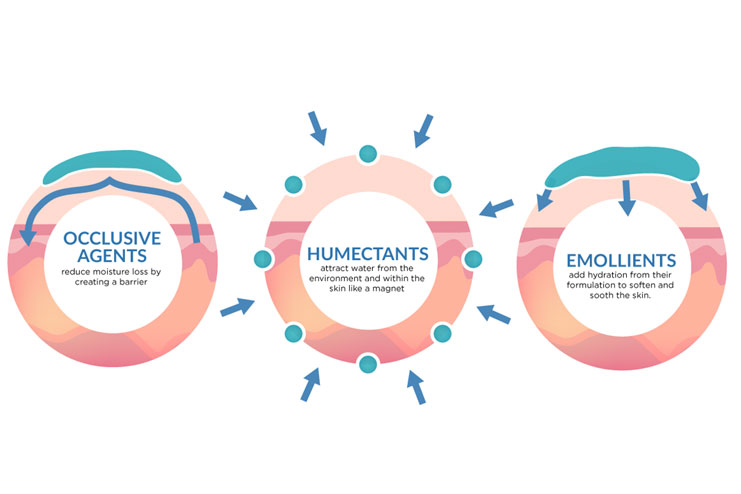
What is similar?
Humectants, emollients and occlusive are all moisturizers with different functions. The best part of these ingredients is that they are healthy and fulfilling together on the skin. These ingredients can individually be added to products. However, there would be something missing in the product if they are not added together.
What is different?
The difference in these three ingredients is in how they feel, work, and its side effects.
Humectants
- Some of the humectants are glycolic acid, urea, glycerine, AHA, lactic acid.
- A humectant attracts water from the external layer of the skin or humid air.
- When only a humectant is used on the skin, it leaves a sticky texture.
- A few synthetic ingredients in this humectant might cause skin irritation.
Emollients
- Some of the emollients are ceramides, lauric acids, and fatty acids.
- Emollient moisturizers are known for softening your skin and hydrating all dryness. This ingredient doesn’t affect the amount of water in your skin.
- Emollients make your skin feel good and never cause any kind of skin irritation.
Occlusive
- Some of the occlusive areBeeswax, mineral oils, silicones, zinc oxide, lanolin, dimethicone, and petroleum jelly.
- Occlusive are moisturizers that shield the water on your skin derived from the skin or environment.
- It has got a heavy formula.
- There is a risk of suffering from skin issues such as dermatitis and folliculitis.
Conclusion
Humectants pull water molecules and moisturize the hair and skin. They work well with emollients and occlusives. Therefore, this is how humectants in skincare are important.
Humectants are dependent on other ingredients to work effectively. Low concentration humectants are more than sufficient to make your skin soft and healthy.
Besides humectants in skincare, they are good with keeping hair hydrated, voluminous, and soft too.









